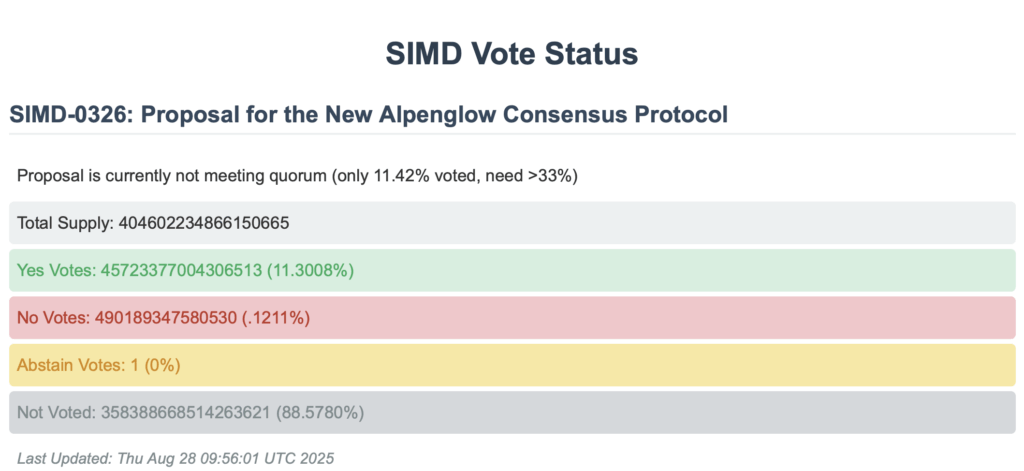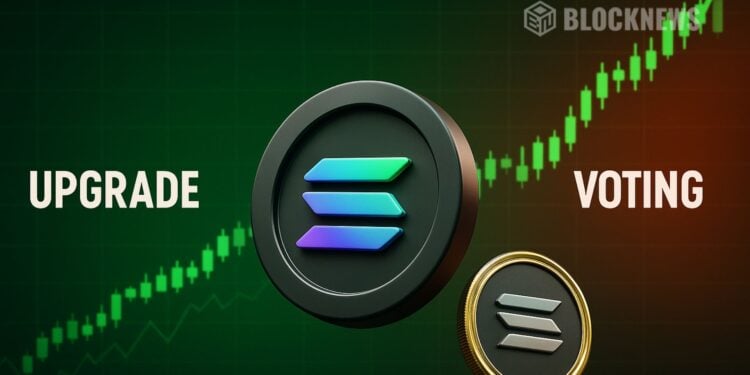- Solana has begun voting on the Alpenglow upgrade (SIMD-0326), aiming to replace Proof-of-History and TowerBFT with a faster consensus system that finalizes blocks in just 100–150 milliseconds.
- The upgrade introduces Votor, a direct-voting protocol with fault tolerance, validator fees, and off-chain voting to boost fairness, reduce overhead, and improve security.
- For approval, Alpenglow needs 33% quorum and two-thirds majority; so far only 10% of validators have signaled support, meaning broader participation is still crucial.
Solana has kicked off the validator voting phase for Alpenglow, a sweeping consensus overhaul that many are calling the biggest upgrade in the network’s history. The proposal, known formally as SIMD-0326, is already attracting support, with over 10% of validators signaling “yes” votes early on. For it to pass, though, the plan will need at least 33% quorum and a two-thirds majority from those who participate.
Why Alpenglow Matters So Much
Community members aren’t exaggerating when they say this is Solana’s boldest step since launch. Analytics firm Solana Floor even labeled it the most important consensus proposal the chain has ever faced.
At its core, Alpenglow would rip out the old Proof-of-History (PoH) and TowerBFT combo and replace them with a new consensus architecture built for near-instant block finalization. Right now, TowerBFT can take nearly 13 seconds to finalize a block. Alpenglow promises to slash that down to 100–150 milliseconds—basically Web2 speed but with blockchain-level security.
One user summed it up perfectly: “Basically, Web2 speed with blockchain security.”
How It Works: Meet Votor
The real engine of this change is Votor, a lightweight, direct-voting protocol. Instead of heavy gossip traffic clogging the network, validators exchange votes directly and aggregate them cryptographically. Depending on conditions, finalization could happen in either one or two rounds of voting.
This design dramatically cuts down on overhead and fixes long-standing pain points. TowerBFT, for example, doesn’t have formal safety guarantees and leaves the network open to risks like reorgs due to its long finality times. Alpenglow introduces a sturdier structure with three standout features:
- 20+20 fault tolerance: The network stays live even if 20% of validators act maliciously and another 20% simply drop offline.
- Economic fairness: Validators must pay a small Validator Admission Ticket (VAT) fee of 1.6 SOL per epoch, keeping skin in the game and deterring freeloaders.
- Off-chain voting: By cutting per-slot vote transactions, Solana reduces both costs and bandwidth demands.
Rewards also get a tweak. Leaders who aggregate votes earn the same as validators included in blocks, and there’s an extra bonus for producing finalization certificates, aligning incentives across the board.
The Voting Timeline
The voting process itself rolls out over several Solana epochs:
- Epoch 833–838 → Open discussion phase
- Epoch 839 → Stake weights are published
- Epochs 840–842 → Voting tokens distributed and cast
Validators will use a Jito-built distribution tool to claim their tokens, which they can then send to addresses representing Yes, No, or Abstain.

For the proposal to pass, “Yes” must account for at least two-thirds of total Yes+No votes, provided the 33% quorum is met. At the moment, only about 10% have jumped in, so it’ll need more momentum to cross that bar.
Final Thoughts
If Alpenglow goes through, it won’t just be another network tweak—it could redefine how fast and reliable Solana feels to both users and developers. Near-instant finalization, fairer validator economics, and lower overhead might finally push Solana into Web2-level performance while keeping Web3 decentralization intact.
The catch? It all depends on validators stepping up to vote. Right now, the future of Solana’s consensus is literally in their hands.














